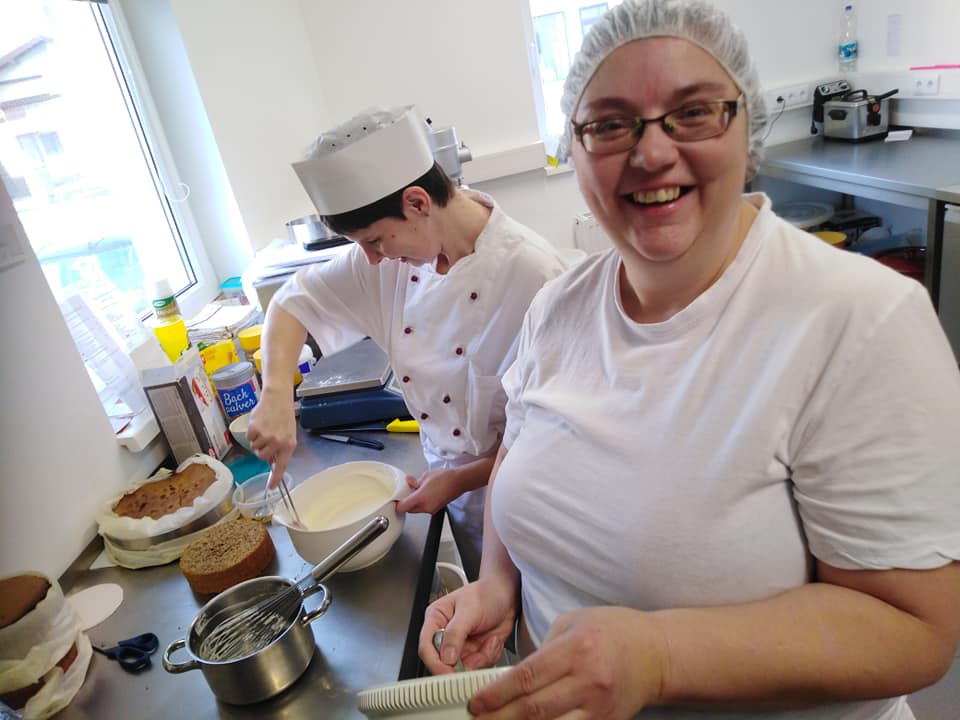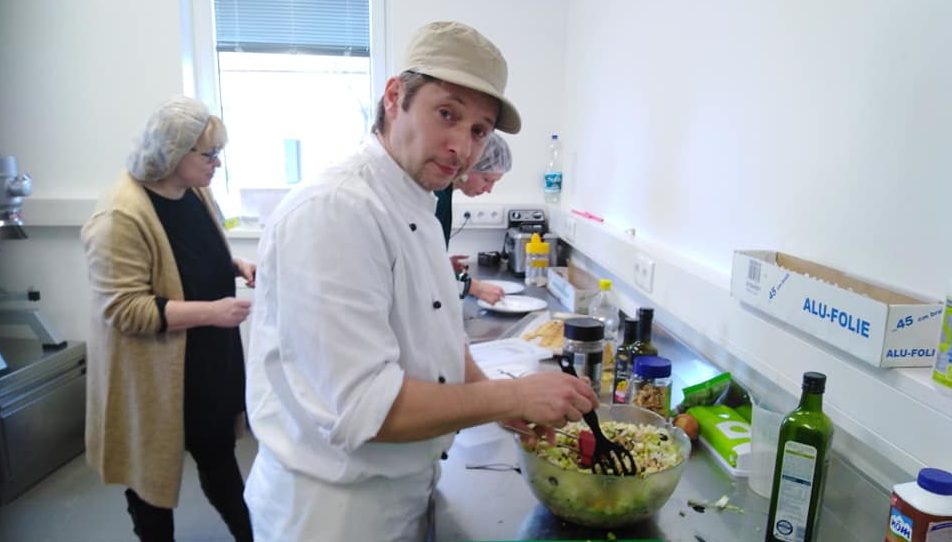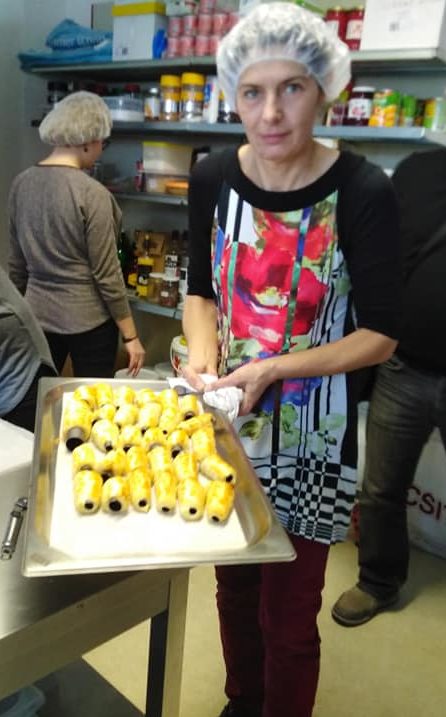WEIBERWIRTSCHAFT
Socio-economic employment project
Interview with Nina Piniel, CSR Manager, Human Resources Manager
Specialization
In 2019, the socio-economic project WEIBERWIRTSCHAFT was opened after a long preparatory phase.
WEIBERWIRTSCHAFT (“women’s economy”) is a social enterprise funded by the Government of Burgenland with EU funds and offers temporary jobs and training places in a coffee house, bakery/kitchen, cleaning and offices. The core tasks of the project are the production of tartes and cakes, breakfast, sandwiches and other small dishes. The products are sold in-house in the café or delivered to the customers.
After six to nine months of training at the workplace, the trainees leave and are to be placed in the first job market.
WEIBERWIRTSCHAFT has a regular staff of 6 employees and a program for 10 transit personnel. These transit workers get work training and should be made fit for promising careers with good employers.
The target group is people who are unable to enter the labour market immediately due to various hurdles or who have been away from the labour market for a long time. In other words, this project is an active example of age management. In total, more than 80 people will be brought into employment in three years.
Since the beginning of the project, 30 jobs have already been created.
The company produces only full-fledged organic products, the website has an extensive online assortment and a detailed lexicon of the cereals used.
Sector
Second: Foodproduction – bakery, pastry
mixed with the third sector – Café
Country
Austria
Main reasons and motives for the decision to implement the age management measures
Better working climate
We wanted to achieve the results formulated in order to have a better working environment. In our industry, no day is like the other. We depend on the short-term wishes of our customers (birthday parties, company celebrations, etc.) and have to handle our personnel deployment flexibly. It is important that employees also understand this problem. At the same time, we also want to take responsibility for our environment, nature and the local community.
No discrimination against older employees & better operating results
In addition, we wanted to implement a generation management process. We want to create an environment in which all employees feel comfortable and appreciated. Many people nowadays have to leave their jobs prematurely because they are burned out. Feedback from the employer is mostly missing. This is exactly what we want to improve: we want to hold regular employee interviews. We want to check whether the person is employed in the right place, whether the goals for further training are realistic.

Older workers, especially women, are often very intimidated. They feel ashamed to be over 50 years old, rather than proud of their age, their performance and life experience. Older workers are often pushed into the role of supplicants, they do not dare to ask anything or propose changes. Often they are satisfied just to have work at all. With our project, we stand against this development. We want to value the knowledge of the elderly and good jobs for all, old or young, for men and women.
Everyone should have the opportunity to develop themselves personally and to participate in the success of our project.
Knowledge
Especially for companies with high moral standards, it is important to convey the company philosophy to all employees and to secure knowledge in the company. The public should also understand what our company goals are.
Age management dimension
WEIBERWIRTSCHAFT is committed to sustainability in the rural region of Burgenland and wants to take particular care of the problem of the ageing workforce, especially women aged 50+ are affected by a high unemployment rate.
Career Development
- Identification of individual opportunities for further training and preparation of a step-by-step plan
- Development of career planning adapted to the professional groups (bakers, cooks, waiters…)
- Preparation of application documents in order to have good chances in the labour market
Job Recruitment
- Abolition of age limits in vacancies to promote greater diversity (age, education, cultural background)
- Thorough hiring to avoid drop-outs
Learning, training and lifelong learning
- Monthly employee interviews
- Tasks and work are organised in a way that makes learning and further development always possible
Health protection
- Occupational health protection (hygiene training, first aid training)
- Organization of breaks
- Avoidance of (long-term) sick leave
Expected results
We expect greater team cohesion and the willingness of the employees to really work until the age of 65 years. (65 years is the official age for men to retire in Austria, for women it is currently 60 years. From 2023, it will also be slowly raised for women.) We need to create open dialogues on issues such as different age groups, occupational groups and, above all, different cultures. Through the open discussion and implementation of measures, we want to convey an understanding of the benefits for all age groups, as well as different educational or cultural backgrounds.
Further desired results
-
- freer break design (more short breaks, smoking allowed during breaks)
- more individualized working time (part-time work, short/long weeks, short-term leave)
- more support for vocational education and training (educational leave)
- reduction of sick leave (reintegration part-time)
- willingness to work overwork at peak work

Our way towards the age management
So what are we doing to achieve this goal as well as possible?
- The first step was the recruitment of an employee with high social competence, a social pedagogue who takes care of the process of the CSR (Corporate Social Responsibility) and the entire human resources management.
- When new employees are hired, we now make a precise anamnesis. For this purpose, a separate catalogue has been developed, it includes the following questions:
- How many hours do I want to work?
- How much money do I have to earn, or do I want to earn?
- How long can I stand?
- What weight can I lift?
- What hours do I want?
- What does my ideal workplace look like?
- Am I sensitive to noise?
- Do I prefer to work alone or as a team?
- What / who / where do I want to be in a year?
With questions like these, we want to make employees sensitive to their wishes and needs and also make them aware that they are allowed to have a say. We then try to organize the workplace as close as possible to these wishes. Of course, this does not always work. But it is very important to talk about it. What does the employee want, what can the employer offer? This is a key question about job satisfaction. But this question is not often asked. Open communication makes it possible for practitioners not to be afraid to express wishes or to address problems. If you are “allowed” to do this, you stay healthy and productive for longer.
- After the first interview, the employee receives a manual with our agreements. The service contract and the collective agreement are part of this, as is the philosophy of our company. The names and telephone numbers of the management team are noted as well as the office hours of the HR manager.
- After the first month, there is another appointment for a meeting: does the workplace meet my expectations? What could be better? What do I want to change? How am I doing with my colleagues? If possible, these requests will be processed, and open communication is also very important here. At these meetings, the employee also receives individual feedback and suggestions for further development. If necessary, appointments can be made once a week with the social pedagogue.
- Other offers for the intergenerational contract are mixed teams – older and younger work together or “new” and “old”. The principle of mutual esteem is very important to us. Production, service, and administration must work together. It is important to understand that everyone is part in creating the success of the company.
- Making use of the possibilities provided by the State of Austria: WEIBERWIRTSCHAFT established close contact with the social partners (Chamber of Labour, Chamber of Commerce, Chamber of Agriculture and Trade Unions) and the AMS (Labour Market Service), in order to benefit from the legal possibilities to support older workers. These measures include:
-
- Integration allowance (for older workers)
- Educational leave (to finance high-quality continuing education)
- Part-time work for old age (for a good transition to retirement)
- Part-time reintegration (after long sick leave)
- Work adjustments are made. In production, manual lifting of loads is a problem, as is the long standing in one place. Employees are encouraged to support each other. Short breaks may be chosen individually.
- For the breaks there is a private room with comfortable furniture or an outdoor balcony, also with seating.
- A change of workplace within the company is possible, e.g. from the kitchen to the service or vice versa.
- Tandem work: at the start of work, the new employee receives an experienced colleague, who explains the workplace to her in detail and accompanies her intensively in the first period. This can take up to a month. From the very beginning, the new colleague has a confidant in the team who can she turn to.
Strengths and weaknesses of our approach
Strengths
- Our employees feel valuable. They like to work; their identification with the workplace is very high.
- Our company is recognized by the public as a social employer, which opens up to new customers.
- The thorough interview and the manual provide clarity about the workplace.
- The tandem system helps a lot in integration into the workplace.
- Flexible working hours help you stay healthy for longer.
- The working atmosphere is good; people are joking and kicking together, even while working!
- There are ways to change the work areas in the company or to change the working time.
- Continuing education including career planning is supported, which strengthens the employees.
Weaknesses
- This is a very high effort to devote oneism to CSR and personnel development. In other companies that are as small as we are, not as much money is spent on it.
- Sometimes employees are overwhelmed with this form of participation and participation because they have never been asked to think about their needs in the workplace.
- Switching between workstations can also unsettle some employees. When a colleague is suddenly in another department, others sometimes feel abandoned.
- Flexibility towards employees makes planning difficult for the management.
Activities to sustain this initiative
Our form of generation management is part of the company’s philosophy. We will definitely continue on our path. Maybe even intensify. The retirement age for women is currently 60, but it will soon be 65. It is very likely that we will soon need more measures on age management. We also want to be part of a sustainable cycle. We are creating jobs for people who are struggling in the labour market. We buy as much as possible regionally and respond to the wishes of the population with our offer. By hiring a CSR manager, these measures are also secured.
Monitoring system of the effects
We understand ourselves as part of the regional community, we are active partners in a social, cultural and political environment. Our CSR strategy is enshrined in our operational principles and includes in particular responsibility for personnel development and community action in our region.
WEIBERWIRTSCHAFT draws up an annual report in which the area of personal and old age management plays an important role. For this purpose, the data on age structure, sick leave, drop-out, further education, etc. are collected and presented in the report.
As mentioned earlier, each employee receives a personal manual. Our agreements are written in it. This ensures that nothing is forgotten and that we can refer to it in the next employee interview.
Beneficial effects of the initiative
- Holistic approach: The management of WEIBERWIRTSCHAFT has implemented a package of measures that deals with the topics of ageing, cultural diversity, diverse educational backgrounds in the company and satisfaction, health and safety at work from different perspectives. These include working conditions and working hours, prevention of health problems, workplace health promotion, intergenerational management, tandem work and retirement.
- CSR and Age Management: With the creation of the position of CSR Manager, the company shows, internally and externally, that it values its employees and wants to prevent any fear of discrimination or exploitation.
- Communication: With the help of careful recruitment, the employee manual, the tandem system and the feedback conversations, a variety of communication channels are offered and used. In addition to the feedback conversations, employees can contact management at any time, the contact details are noted in the employee manual.
- Employee inclusion: In all planning for larger orders or restructuring, employees are involved and have the opportunity to make their contribution.
- Satisfaction in the workplace: Our employees are very satisfied, even happy with their workplace. The feedback is collected in the feedback conversations. There are hardly any longer illnesses in the team, the employees feel a high responsibility towards their workplace and their colleagues.
The Aha! moment experienced during the process
It is so bad how our society system treats people, especially women. It is unbelievable that people are ashamed because they are over 50 years old! I never thought that would happen. I am very proud to work in a company that is very different. I can do something to make people (women) brave again so that they can reflect on their desires and do their work with dignity.
Our recommendation
There should be specific funds for the implementation of age management, including in small and micro-enterprises. Then more companies would certainly participate and benefit from it.
We have managed to obtain EU funding for this process. However, this requires, on the one hand, a specific prior knowledge – these funding pots are not very well known, the submission of the applications requires a great deal of time – and, on the other hand, the will to make a difference.
We think that our society cannot afford to simply overlook and not appreciate such a large group of people, the 50+generation, who are willing to work.
Nor can we afford for the younger ones to have to learn everything themselves. They need role models for shaping their own lives and examples of career paths.

